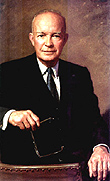|
 Born in Texas, he graduated from
West Pointin 1915. Over the next 25 years, he served at posts around the world and steadily rose through the Army ranks. When the United States entered World War II after
Pearl Harbor, Eisenhower became one of the
Allies' foremost military strategists. As commander of U.S. forces in Europe, he planned the invasions of Northern Africa (1942), Sicily and Italy (1943). Promoted to Allied
commander in chief, he directed the
Normandy invasion(June 1944) and the brutal year-long campaign through Europe which led to the German surrender. In December, 1944, the Army made him a five-star general, its highest rank. Born in Texas, he graduated from
West Pointin 1915. Over the next 25 years, he served at posts around the world and steadily rose through the Army ranks. When the United States entered World War II after
Pearl Harbor, Eisenhower became one of the
Allies' foremost military strategists. As commander of U.S. forces in Europe, he planned the invasions of Northern Africa (1942), Sicily and Italy (1943). Promoted to Allied
commander in chief, he directed the
Normandy invasion(June 1944) and the brutal year-long campaign through Europe which led to the German surrender. In December, 1944, the Army made him a five-star general, its highest rank.
After the war, he briefly headed the U.S. occupation forces in Germany, then returned to Washington to serve as Army chief of staff. In 1948, he retired from active military duty and became president of Columbia University. Two years later, he returned to military leadership as commander of NATO forces in Europe. In 1952, both political parties courted the extremely popular war hero as a possible presidential candidate. He
opted torun as a Republican, easily won the election and served two terms. As President, he forged a quick truce in the Korean War in 1953 and later pursued international disarmament agreements, albeit with little success. He also adopted a hardline anti-communist stance, using military aid and occasionally U.S. troops to counter Soviet expansionism and to undermine leftist movements around the world. In domestic policy, he strove to remain nonpartisan and exerted little direction.
|
|
note:
|
West Point: 西点军校
Pearl Harbor:珍珠港,
美一军事海港,位于太平洋
Allies: 盟军,
指二战时以英美苏为首的反法西斯同盟
commander in chief: 总司令
Normandy invasion: 诺曼底登陆(1944年6月6日)
opted to: 选择
|
|
